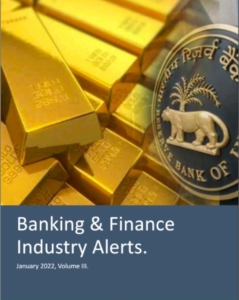Banking & Finance Industry Alerts
What’s the Buzz?
The year 2021 was eventful for the banking industry, with the COVID-19 pandemic shaping various regulatory compliance measures to ensure safety and ease in banking. Below are some of the key developments:
RBI Annual Report 2021
The Reserve Bank of India (RBI) reported the following key financial and economic highlights:
- The RBI’s balance sheet grew by 6.99% (₹3,72,876.43 crore) from ₹53,34,792.70 crore (as of June 30, 2020) to ₹57,07,669.13 crore (as of March 31, 2021).
- Foreign exchange transaction gains increased by 69%.
- Bank frauds (by value) declined by 25% to ₹1.38 trillion, while fraud cases (by number) fell by 15%.
- Banknotes in circulation saw a higher-than-average increase due to precautionary cash holdings during the COVID-19 pandemic. The value of banknotes rose by 16.8%, and the volume of banknotes increased by 7.2% in 2020-21.
NBFCs Can Now Recover Loan Defaults of ₹20 Lakh Under SARFAESI
The Union Budget 2021 proposed lowering the threshold for NBFCs to initiate faster loan recoveries under the SARFAESI Act. With rising loan defaults due to the pandemic, NBFCs had been advocating for a lower limit to ensure swift action against defaulters.
Previously, only banks could use the SARFAESI Act for loans above ₹1 lakh, while NBFCs had higher limits. The Finance Industry Development Council (FIDC) lobbied for parity between banks and NBFCs in pre-budget discussions.
Digital Lending Regulations: RBI’s Directives for Banks & NBFCs
The RBI issued guidelines addressing concerns over digital lending platforms engaged by banks and NBFCs. Many digital lenders fail to disclose their banking partners, leading to customer complaints about:
- Exorbitant interest rates
- Non-transparent loan terms
- Harsh recovery practices
- Unauthorized use of personal data
RBI’s Instructions for Digital Lending
To protect borrowers, the RBI mandates that banks and NBFCs engaging with digital lending platforms must:
- Publish the names of their partnered digital lending platforms on their official websites.
- Ensure platforms disclose upfront the name of the bank/NBFC they represent.
- Provide loan sanction letters on the bank/NBFC’s letterhead before loan execution.
- Furnish loan agreements and all relevant documents to borrowers at disbursement.
- Implement effective oversight and monitoring of their digital lending partners.
- Promote customer awareness regarding grievance redressal mechanisms.
Violations of these directives will be strictly penalized by the RBI.
Increased Collateral-Free Loans for SHGs Under DAY-NRLM
The RBI increased the limit of collateral-free loans under the Deendayal Antyodaya Yojana – National Rural Livelihoods Mission (DAY-NRLM) from ₹10 lakh to ₹20 lakh.
Key Highlights:
- No collateral or lien will be placed on Self-Help Group (SHG) savings accounts for loans up to ₹20 lakh.
- DAY-NRLM is a Government of India initiative aimed at reducing poverty by allowing states to develop customized poverty reduction plans.
The Year of Banking Penalties
The RBI imposed heavy penalties on commercial banks in 2021 for non-compliance with regulatory requirements.
Common Violations:
- Non-compliance with the Banking Regulation Act, 1949 (particularly Section 47(A), granting RBI the power to impose penalties).
- Failure to observe regulations for opening savings deposit accounts for cooperative banks.
- Irregularities in board composition of certain banks.
- Failure to comply with fraud classification and reporting guidelines under the RBI’s 2016 fraud detection rules.
- Delayed reporting of cybersecurity incidents to the RBI.
- Failure to credit amounts involved in unauthorized electronic transactions within the prescribed period.
HARBINGER 2021: Innovation for Transformation
The RBI launched HARBINGER 2021, its first global hackathon, with the theme: “Smarter Digital Payments.”
The objectives of the hackathon include:
- Enhancing access to digital payments for underserved communities.
- Improving ease of payments and user experience in digital transactions.
- Strengthening security measures in digital payments.
- Promoting consumer protection in the fintech space.
RBI Allows Lenders to Sell Fraud Loans to ARCs
The RBI has permitted lenders to transfer fraud-classified loans to Asset Reconstruction Companies (ARCs). This move aims to:
- Facilitate resolution of fraud accounts.
- Shift responsibilities for reporting, monitoring, and law enforcement actions to ARCs.
- Allow focused recovery efforts on trillions of rupees worth of non-performing loans.
However, transferring these fraud accounts to ARCs does not absolve banks from fixing internal accountability.
New Rules for Securitization of Standard Assets
The RBI introduced revised rules for the securitization of standard assets. These rules apply to:
- Scheduled commercial banks (excluding RRBs)
- All-India term financial institutions
- Small Finance Banks (SFBs)
- Non-Banking Financial Companies (NBFCs)
Minimum Retention Requirement (MRR) Guidelines
- For loans with an original maturity of 24 months or less → 5% of the book value must be retained.
- For loans with a maturity of more than 24 months (including bullet repayment loans) → 10% retention is required.
The banking and finance industry continues to undergo significant regulatory changes to:
✔ Enhance consumer protection
✔ Streamline digital lending practices
✔ Tackle financial fraud and non-compliance
✔ Encourage financial inclusion and innovation
This publication is for general informational purposes and does not constitute legal advice. © 2022 Astrea Legal Associates LLP





